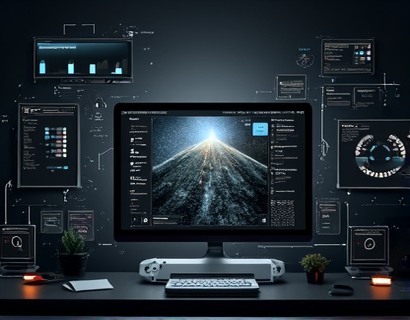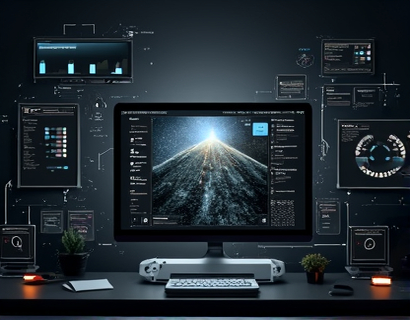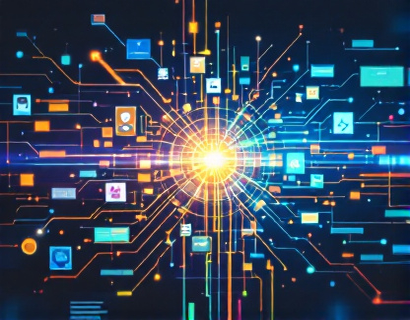Harnessing AI for Optimal Life Strategy: A Guide to Elevating Productivity and Achieving Goals
In the fast-paced world of today, the demand for efficiency and effectiveness in both personal and professional life has never been greater. The integration of Artificial Intelligence (AI) into daily routines offers a transformative solution, providing individuals with intelligent insights and tailored guidance to elevate productivity and achieve their goals. This article delves into the realm of AI-powered life strategy, exploring how these advanced tools can simplify decision-making, enhance task management, and support the attainment of personal and professional milestones.
The concept of an AI-driven personal assistant is not new, but recent advancements in technology have made these tools more accessible and sophisticated. These intelligent systems leverage machine learning algorithms to understand individual behaviors, preferences, and goals, offering personalized recommendations and actions to optimize daily activities. For individuals seeking to boost their efficiency and effectiveness, an AI-powered assistant serves as a valuable ally, providing a seamless and efficient way to manage daily responsibilities and navigate life's challenges.
Understanding AI-Powered Personal Assistants
An AI-powered personal assistant is a digital tool designed to assist users in managing various aspects of their lives. These assistants use natural language processing, machine learning, and data analytics to interpret user inputs and provide relevant outputs. Unlike traditional task managers or calendars, AI assistants can adapt to the user's evolving needs, learning from past interactions to offer more accurate and useful suggestions.
One of the key features of these assistants is their ability to integrate with multiple platforms and applications. This integration allows for a unified approach to managing tasks, emails, appointments, and reminders. By centralizing information, AI assistants reduce the cognitive load on users, enabling them to focus on high-value tasks rather than getting bogged down by administrative duties.
Enhancing Decision-Making with Intelligent Insights
One of the most significant benefits of an AI-powered personal assistant is its ability to enhance decision-making. By analyzing vast amounts of data, these tools can identify patterns, trends, and insights that might not be immediately apparent to the user. For instance, an AI assistant can review past project timelines, resource allocations, and outcomes to suggest optimal strategies for future endeavors.
Moreover, AI assistants can provide real-time recommendations based on current circumstances. For example, if a user is faced with a complex problem, the assistant can offer potential solutions, weigh the pros and cons, and even predict the likely outcomes of different choices. This capability is particularly valuable in professional settings, where quick and informed decisions can significantly impact business success.
Streamlining Task Management
Effective task management is crucial for maintaining productivity and achieving goals. An AI-powered personal assistant excels in this area by offering sophisticated task management features. These include automated task creation, priority setting, and deadline reminders. The assistant can also break down large projects into manageable tasks, assign due dates, and track progress, ensuring that nothing falls through the cracks.
Another innovative feature is the ability to prioritize tasks based on urgency and importance. Using algorithms, the AI can assess the significance of each task in the context of the user's overall goals and current commitments, suggesting the most efficient order of operations. This helps users avoid the common pitfall of focusing on less critical tasks while important ones are neglected.
Supporting Personal and Professional Growth
Beyond daily task management, AI-powered assistants can play a pivotal role in personal and professional growth. By analyzing user habits and performance, these tools can identify areas for improvement and offer tailored recommendations. For example, if an individual consistently struggles with time management, the AI can provide strategies and techniques to enhance focus and productivity.
Professional development is another area where AI assistants shine. They can curate relevant learning resources, such as articles, courses, and webinars, based on the user's career aspirations and current skill gaps. This continuous learning loop ensures that users stay updated with the latest industry trends and best practices, fostering long-term growth and success.
Navigating Life's Challenges with Ease
Life is inherently unpredictable, and unexpected challenges are inevitable. An AI-powered personal assistant can be a valuable resource in navigating these challenges. Whether it's managing a sudden change in work priorities, dealing with personal emergencies, or planning for long-term goals, the assistant can provide structured support and guidance.
For instance, in times of stress or overwhelm, the AI can suggest relaxation techniques, mindfulness exercises, or even recommend a break to prevent burnout. By monitoring the user's mental and emotional state, the assistant can offer timely interventions to maintain well-being and resilience.
Customization and Personalization
A key factor in the effectiveness of an AI-powered personal assistant is its ability to customize and personalize its services. Each individual has unique preferences, work styles, and goals, and a sophisticated AI assistant can adapt to these differences. Through initial setup and ongoing interactions, the AI learns the user's preferences, adjusting its recommendations and actions accordingly.
Users can also provide feedback to refine the assistant's performance. This two-way interaction ensures that the tool remains relevant and useful, continuously evolving to meet the user's changing needs. The level of customization extends to the interface and communication style, allowing users to interact in a way that feels most natural and comfortable.
Privacy and Security Considerations
As with any technology that handles personal data, privacy and security are paramount concerns. Reputable AI-powered personal assistants implement robust security measures to protect user information. This includes encryption for data transmission, secure storage of sensitive information, and compliance with data protection regulations.
Transparency is also crucial. Users should have clear insights into what data is collected, how it is used, and the options for managing their privacy settings. By prioritizing user trust, these assistants can effectively support individuals in their journey towards enhanced productivity and goal achievement without compromising personal privacy.
Case Studies and Real-World Applications
To better understand the practical applications of AI-powered personal assistants, let's explore a few real-world scenarios. In the corporate world, executives use these tools to manage their busy schedules, prioritize meetings, and prepare for presentations. The AI assistant can analyze calendar entries, email communications, and project updates to suggest optimal meeting times and prepare relevant documents.
For students, an AI assistant can help manage coursework, set study schedules, and provide reminders for assignments. By integrating with educational platforms, the assistant can track progress, identify areas needing improvement, and recommend additional resources for better understanding.
In the realm of personal finance, AI assistants can monitor spending patterns, create budgets, and offer savings strategies. By analyzing financial data, the assistant can identify unnecessary expenses and suggest ways to optimize savings, contributing to long-term financial stability.
Future Trends in AI-Powered Life Strategy
The field of AI in personal life management is rapidly evolving, with ongoing advancements promising even more sophisticated and integrated solutions. One emerging trend is the integration of emotional intelligence, enabling AI assistants to better understand and respond to the user's emotional state. This could lead to more empathetic and supportive interactions, enhancing the overall user experience.
Another area of development is the incorporation of augmented reality (AR) and virtual reality (VR) technologies. These immersive experiences could provide users with interactive tutorials, simulations, and visualizations to aid in learning and decision-making. For example, an AR-powered assistant could overlay information about a user's surroundings, offering real-time guidance and insights.
Additionally, the convergence of AI with the Internet of Things (IoT) will allow for more seamless integration with smart home devices, wearables, and other connected technologies. This holistic approach can create a more cohesive and automated environment, further simplifying daily life and enhancing productivity.
Conclusion
AI-powered personal assistants represent a significant leap forward in the quest for enhanced productivity and goal achievement. By leveraging advanced technologies such as machine learning, natural language processing, and data analytics, these tools offer intelligent insights and tailored guidance to simplify decision-making, streamline task management, and support personal and professional growth.
As the technology continues to evolve, the potential applications and benefits will only expand. For individuals seeking to optimize their daily routines and navigate life's challenges with greater ease, an AI-powered personal assistant is an invaluable resource. Embracing this innovative solution can lead to a more efficient, effective, and fulfilling life.










































